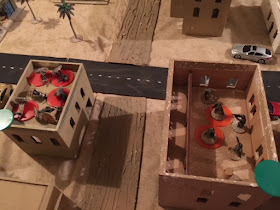I started my first play-test with just the 'hordes' portion of the rules test, trying out the conventional ground combat to ensure that the basics work in this system before adding anything else. Before I can add superpowered characters, psionic powers, and suits of power armor to the mix, I need to make sure that it can handle modern ground combat.
For the scenario, two squads of US Army troops (total 18 soldiers) will square off against six insurgent sections of seven men each, with the goal of rescuing a downed pilot stuck in an insurgent-controlled area. Here's the layout:
US Army fire teams on either side of both of the roads.
Downed pilot in need of rescue.
Looking down the road on the right...
...and the left.
An early round of fire knocks out most of an insurgent cell and chases the surviving two fighters out the back of the building
Turn 2:
US fire team at bottom lands effective fire on the insurgent cell at top center of frame as US forces trade fire, but don't advance very far.
Turn 3:
Insurgent cell fires on US fire team making a break across some open ground, at far end of shot. They failed to connect and the Americans capitalized on poor insurgent marksmanship.
Americans in building at left take casualties while dishing out some fire on the insurgents at right. The green stress markers reduce unit efficiency as they accumulate in the turn. The orange markers represent wounded troops, the red markers dead ones.
Same firefight, reverse angle - US fire team on right, insurgents on left. The first aid skills of the US troops keeps their casualties in the fight, even if wounded. The insurgent cell isn't faring as well.
Same fight, insurgents getting wiped out.
The insurgents closest to the downed pilot take casualties in a long-range exchange of fire.
The same insurgent cell miraculously administers effective first aid and gets back up to fighting strength.
...and then a lucky grenade launcher shot lands inside the building and wipes them out.
Of the last two insurgents, one is killed by American fire, and the other is no match for the mass of US firepower on the board.
Lessons learned:
1. I need to settle on a morale system. As the game went on, I tinkered with different ideas about how to execute it. The insurgent morale needs to be lowered for factions without leaders. Leaders will add both initiative and morale bonuses to insurgent cells, just as they do to conventional units, but the insurgents will have lower baseline statistics and need leaders to try to keep up with conventional troops.
2. I need to finalize my first aid system. Still playing with how to handle this.
3. Optics need to cost more. Right now, rifles have 24"/48"/96" ranges, and the effect of all optics - reflex or magnified - is to double range. This makes optic-equipped rifles deadly in the hands of conventional troops with adequate marksmanship training, and gives them a marked advantage over the insurgents. An overwhelming advantage, almost. At no point did the insurgents ever have much of a fighting chance after the bullets started flying.
4. Grenade launchers need to cost more. In Force on Force, they just add another die of firepower. When you give them a blast radius, a lucky shot can be a game changer as it was at the end of this play test.
Overall, not a bad test of the developing rules, but I've got a ways to go.














This comment has been removed by a blog administrator.
ReplyDelete